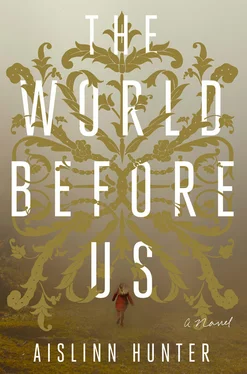“Janey?” He sounds annoyed, as if he is trying to decide whether she’s there, staring at the answering machine. Jane hears a nasally exhalation and then the sound of him taking a drag of his cigarette before he begins speaking quickly. “Listen, Lewis telephoned. I know about tonight. I can fly in next week if you need me to. It would just be for a few days. Inga and I are in Vienna.” He’s using the same tone she’s heard him use with waitresses and drivers and lazy violinists. For a second there’s the muffled noise of him speaking to someone else. Jane can make out semaine and mettre au point . She wonders briefly if he is going to say something real, say William’s name, or Everything will be okay , or I’m sorry I haven’t called in so long , but when his voice returns, he adds, “Lewis has the number of the hôtel ,” and then there’s the old-fashioned clatter of a phone being hung on its cradle.
In the quiet that follows, Jane takes off her cotton glove, reaches down and picks up the largest piece of the teacup, the section with the scroll handle still attached. This is her first accident in the eight years she’s been at the Chester. It is as if she’s seeing the shard from a distance, as if the floor of her office has gone slant. When she finds her breath she sets the piece on her palm to inspect it, the handle suddenly absurd — its bone-china ear attached to a wedge that can hold nothing.
We did not break the teacup. When the phone on the desk rang, most of us were crowded into the office, standing or sitting against the walls, some of us with our invisible chins cupped in our invisible hands, the children stirring tufts of dust along the baseboard even though we’d told them repeatedly to stop. If one of us had broken it, there would have been a ripple of tension in the throng. Such overt acts — touching the hair of those sleeping, opening doors, turning pages or knocking things over, even lifting the drooping heads of flowers in their vases — are forbidden. When they do happen, by mistake, out of rage or hope or despair at the constant watching and wishing, the reverberation is called “fluttering.” We have only fluttered Jane once — when she stood on the bottom step in front of a house we wanted her to enter, all of us wishing her forward as a gust of wind.
Jane puts the piece with the handle down and smooths her skirt. She is thinking, If the museum wasn’t closing, I’d be sacked; and Queen Victoria has probably held this teacup; and I’ve just cost the museum three thousand pounds . Jane cares about the Duchess and her tea set, but we do not. The Duchess’s life is well researched; her portrait has been painted, and her peach-skinned likeness hangs in the imagination because of it. Even Jane, when she was copying the milk jug’s catalogue number onto the bill of sale, conjured her correctly: a plump woman in a wide-brimmed hat and striped dress sitting in the middle of a manicured lawn trying to stretch the act of sipping tea across the hours. What we care about is Jane. Jane who has the ability to show us back to ourselves, to bring our own faces and clothes and jaunty hats out of the past, to place us on lawns and in gardens and on the porches of houses, an apron of sun before us.
The last time Jane spoke to her father was three years ago; he’d come to London and they’d met at a sleek new bar on the Strand. He’d suggested it, explaining that it was near his hotel. She remembers how the maître d’ and bar manager deferred to Henri, how this made it obvious that he’d been in town for a good few days. He was hungry even though it was late, so he ordered a cut of steak that came to the table so rare Jane couldn’t look at it. She kept to martinis, because Claire had liked martinis and she was somehow trying to conjure the presence of her mother even then. It was almost ten at night by the time they met, and earlier Jane had gone to Harrods to buy a new dress for the occasion. She’d ended up with an expensive green silk scoop-necked piece with pearl buttons up the back — a dress that made her feel self-conscious, as if she were trying too hard to impress him. She remembers now that the conversation was lopsided, the news all his, as if she were interviewing him for some lifestyle article and he felt obliged to speak overlong on every topic. He’d mentioned “Inga” twice in relation to his tour of Croatia, and it had made sense at first because Inga was his management team’s tour organizer, an athletic-looking Swede only a few years older than Jane who had Henri’s whole world on speed-dial. But the third time her name was mentioned it was out of context — she’d joined him on a side trip to Hungary where he’d been commissioned to work with a young composer — and Jane realized Henri was trying to tell her that he was with Inga, officially, outwardly, in the way Jane’s mother had suspected a whole decade before.
At the end of the night Henri waited outside with Jane for her taxi. He kissed her forehead, and in that brief press, standing between the warmth of his lips and the palm of his hand cupping the back of her head, she was happy. As the late-night crowd dwindled behind them, the last of the men and women heading out through the glass door of the bar had looked twice at Henri, because even though he was nearing sixty and dressed casually in black jeans and an old sweater, he was still a commanding figure.
As usual, Jane thinks now, there’s a kind of arrogance behind his phone call: the assumption that he can sail back into her life, after years of dashed-off postcards, and help her; as if what happened between her and William, what happened to Lily, somehow involved him; as if he’d risen to the occasion for her back then, when she was fifteen and needed him.
Flexing her neck, Jane tries to slow her breath, get her thoughts together. She picks up a thin shard of porcelain and touches the nib of its ivy to her wrist, the point lightly pricking her. She calculates, numbly, that the teacup is one hundred and twenty-seven years old, imagines all the clumsy maids and careless children, the repeated washings it has endured — not to mention being packed up and carted across the country numerous times before and after the war. A delicate slip of a teacup that has survived all this, but, Jane realizes with a start, has not survived her.
Gareth knocks on Jane’s office door and then, as he has done since the day he hired her, immediately walks in. She’s still testing the point of the teacup against her wrist when he steps toward the desk.
“Busy?” He rubs his thumb under the bristle of his moustache and eyes the teacup.
“Not really.”
“Is that the Grainger?”
“It is.” She clears her throat. “Was.”
He pulls his spectacles out of his pocket and leans in, the white tufts of hair on either side of his bald spot falling forward. When he straightens up he smooths them back with his palms. “Listen, I rang Oliver at the V&A about you. He says they’ll put you on their inventory list so that if something short-term comes up—”
“Lovely. Thanks. But don’t go to any trouble.” Jane musters a smile, clasping her palms in front of her the way the girls who come through the museum on school tours do when they are corralled into queues and told to behave.
The state of Jane’s office hasn’t changed much in the six weeks since the news about the closure came down, and Jane can tell that Gareth, leaning sideways to look at the stack of solander boxes lined up under her worktable, is registering that fact for the first time. The oak file cabinets have yet to be emptied, a tray piled with books and papers is mushrooming on a swivel chair in the corner, the glass storage case that runs along the side wall is still filled with objects waiting for their archives to be compiled and packed — parts of the Hendry shell collection on the upper shelf, Glauber’s seventeenth-century mammal compendium beside it and a variety of anatomical specimens below. Gareth walks over to get a better look. He slides the glass door back and lifts one of the spirit jars off the shelf and up to the overhead light. Inside, a hairless cat with a bony spine and thin tail floats in formalin; its eyes are stitched into slits, its ears curled forward and as long as a rabbit’s.
Читать дальше












